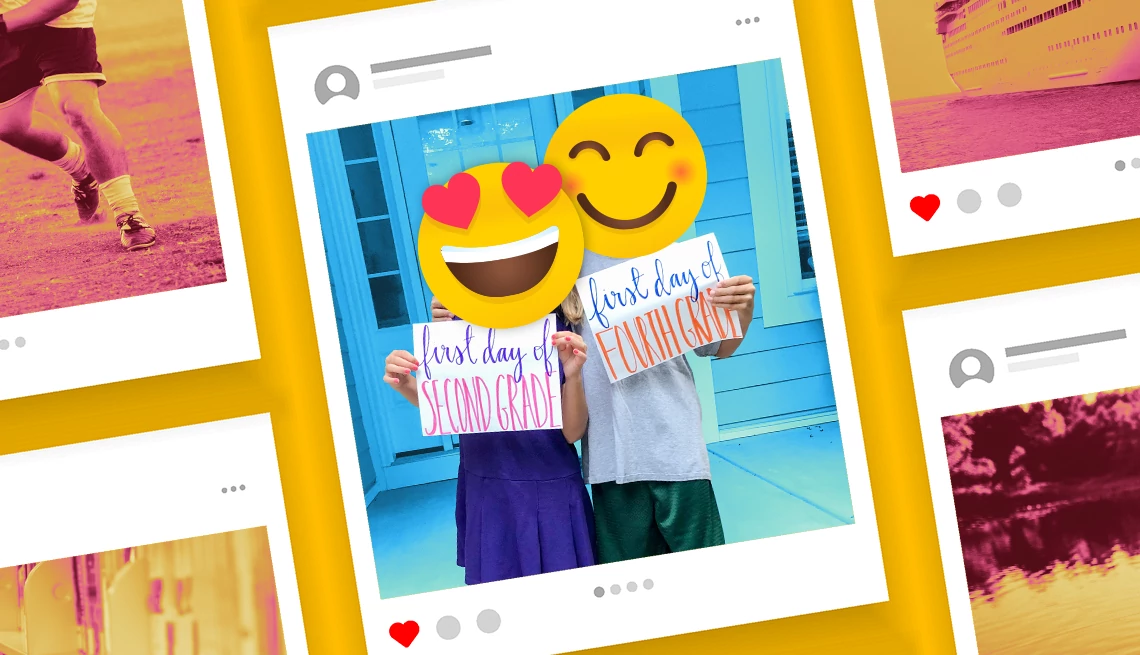AARP Hearing Center


It’s that time of year on social media when proud grandparents post pictures of smiling (and frowning) kids headed back to school. But while images of junior decked out in new togs and hauling an overstuffed backpack may be cute, there is a potential dark side to sharing photos of your favorite kiddos.
The dangers of cyberstalking, bullying, not to mention the countless privacy violations are why some parents (and kids) get annoyed at grandparents posting pictures.


LIMITED TIME OFFER Memorial Day Sale! Join AARP for just $11 per year with a 5-year membership Join now and get a FREE gift. Expires 6/4
OK, but is sharing a little grandparental pride online really so bad?
It can be, says Parry Aftab, who not only is a grandmother but also a preeminent lawyer who has specialized in digital privacy and cybersecurity for more than 20 years. Aftab is a vocal consumer advocate in the New York City area and has advised organizations — from the United Nations to UNESCO — on privacy and the risks to children online.
“I’ve got grandsons, so I know how grandparents can disagree with parents about what happens online,” she says.
Innocuous posts can land elsewhere
Even if you think you’re keeping kids safe from cyberbullying and cyberstalking by not including any identifying information, that still might not be enough. Photos on sites such as Facebook and Google are tagged automatically with a series of keywords that can identify the child, and those photos can end up in databases used by businesses, law enforcement, marketers, schools — even foreign governments, Aftab says.
Or worse.
The extensive use of artificial intelligence (AI) programs has led to the creation of deepfake pornography where the images of real people — including children — are superimposed on pornographic images. Indeed, according to the National Center for Missing and Exploited Children, half of the photos shared by child sexual abusers were initially posted on social media sites by family members. This is why privacy experts often criticize relatives who post too frequently and refer to it as “sharenting.”
Unbeknownst to most consumers, digital photos also often include embedded time and location information, which makes it even easier to track people and their families. So images combined with other clues, like a seemingly innocuous “Happy birthday!” caption, can yield personal information that makes someone more vulnerable to identity theft and fraud.
“It’s important for grandparents to understand that privacy is not about ‘hiding.’ It’s about safety,” says Evan Greer, the director of Fight for the Future, a nonprofit digital-rights advocacy group based in Boston. “Modern technology makes it all too easy for photos or personal information that are shared with the best of intentions to be exploited and used to do harm.”
Everything’s part of their permanent record
Particularly unnerving today is the explosion in the use of facial recognition software to identify millions of individuals in photos and videos. Thanks to a new generation of more accurate and complex computer algorithms introduced in 2015, face recognition has become a nearly ubiquitous tool for marketers and law enforcement alike.
“It’s as if you’re all now part of a virtual lineup all day long,” explains Nita A. Farahany, a professor of law and philosophy at Duke University in Durham, North Carolina, about how the technology can be deployed. With the exception of a couple of states, use of facial recognition technology has virtually no restrictions in the United States, and that can lead to unintended consequences.
- If a photo is taken near a particular location — say, a hospital or clinic — it can reveal health information, a drug dependency or other personal data.
- In some cases, such as tags that may indicate a person or their relatives have sought help from a mental health professional, people can be stigmatized.
- Image scanning even may identify teens at a party where alcohol was served, potentially tarnishing their reputations with future business recruiters.





































































More on Home and Family
How to Talk to Your Kids and Grandkids About AI
7 ways grownups and loved ones can explore togetherNew Tech Tools Protect Consumers From Identity Fraud
Emerging fraud-fighting technologies make it easier to separate impostors from actual customers
4 Ways Grandparents Connect With Grandchildren Today
From technology to travel, it's all about building bonds and memories